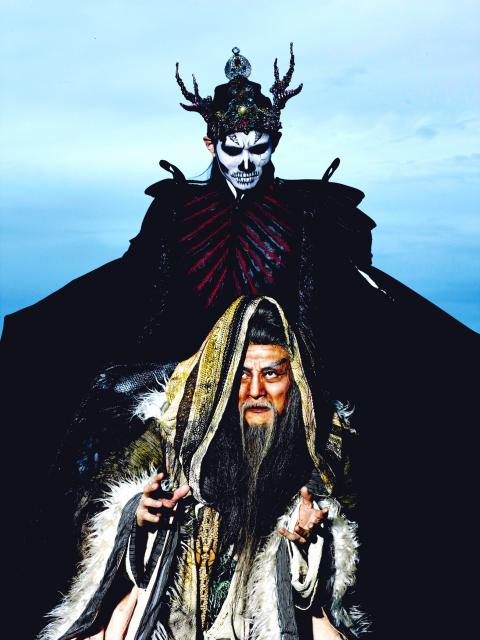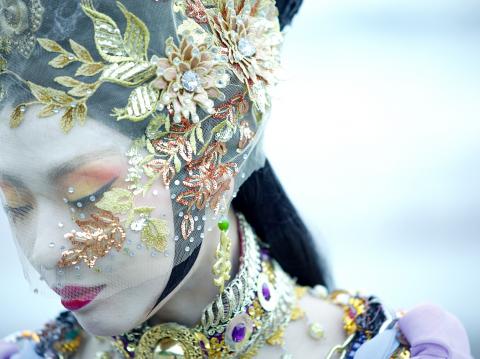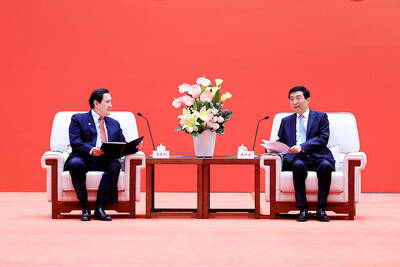The Contemporary Legend Theatre (當代傳奇劇場) has tacked many Western classics since its founding in 1986 — building a reputation for its retelling of William Shakespeare’s greatest hits — Macbeth, King Lear, The Tempest — Greek tragedies and works by Samuel Beckett, Anton Chekhov and Franz Kafka as well as the traditional Beijing opera canon.
However, its creative team really challenged themselves when they decided to tackle the magic mountain of German literature and drama, Johann Wolfgang von Goethe’s Faust.
The epic two-part poem about the Devil’s wager with God and a man who wagers his soul with the Devil in return for earthly fulfillment and rejuvenation took Goethe decades to write, runs to more than 12,000 lines and covers 3,000 years of Western history.

Photo Courtesy of Kuo Cheng-chang
Most productions of Faust focus on Faust I; to do the full play reportedly takes 21 hours, with intermissions. The Contemporary Legend Theater production, which premieres tomorrow night at Zhongshan Hall as part of the Taipei Arts Festival, runs 170 minutes with a 20-minute intermission.
Obviously, artistic director Wu Hsing-kuo (吳興國) and scriptwriter/choreographer Lin Hsiu-wei (林秀偉) had to do some major condensing and selective editing. For help with that, they turned to German Christoph Lepschy, professor of dramaturgy at the University Mozarteum Salzburg in Austria.
In a telephone interview on Monday, Lepschy explained how he got involved in the project.

Photo Courtesy of Kuo Cheng-chang
****“I was actually invited two years ago by the Taipei Arts Festival to give a talk on dramaturgy and they organized a meeting with a couple of theater people. I met with Wu … he told me about his Faust project. Last year I was in Taipei for three months as guest professor … and I met with Wu and Lin Xiu-wei,” Lepschy said.
Wu and Lin already had a pretty good idea of what they wanted to focus on in their retelling of Faust’s story, they wanted to focus on the journey of a life, the questions of “did what I do make sense,” and “would I do it again.”
“It was very clear they were interested in love and desire — Faust and Helena [Helen of Troy], Faust and Marguerite [or Gretchen as she is more commonly known],” he said.
One of the great things about the poem/play is that the storyline is so open, jumping through time and space, so there are endless possibilities for a director to focus on, he said.
“I really admire certain aspects of jingju [Beijing opera, 京劇] — a lot of elements of jingju allow them to get to certain elements of Faust — the emotion … the emotional core of Faust, of Mephistopheles, Marguerite, a couple of ghosts,” he said. “There is the ability to narrow it down, not necessary to have so many characters.”
Lepschy said that even in German productions of the play, it is difficult to do all the characters.
“Especially Faust II, you would get lost, jumping through space and time, but jumping into different characters is a quality of jingju,” he said.
He said one of the highlights of his time working with Wu and the company was “the curiosity that we both share, where we can learn from each other.
“They were very interested in my point of view, the European view of Faust, how to make something out of it,” he said. “Faust is about knowledge, about discourse; they looked at what does this knowledge mean for me?”
Lepschy said the opportunity to see such a familiar work in a different context was another highlight, but the experience had also reminded him just how modern a tale Faust is, as well as how translatable the issues Goethe dealt with are to the modern world, even though it told from a very Western, very European viewpoint.
“Seeing it in jingju, it is refreshing — I think there are in Faust a couple of issues of global concern — the matter of knowledge, what do we do with it, how do you view progress, how to deal with wealth — the development of paper money crucial to Faust, so these make it easy to translate,” he said.
“For a German, it is a relief to see it in a different context. It’s such a classic in Germany, on German stages, some lines you have heard so many times you can’t understand them anymore,” he said.
One other aspect that he said he found interesting was that it was easier for Wu and Lin and the rest of the cast to accept the role that ghosts play in the tale.
“There are so many ghosts around, because of religion, that they are more a part of life [in Taiwan] than in Europe,” he said.
As the company is using just 11 performers to tell such a complex tale, all of them have multiple roles.
In the key roles, Wu will portray Faust as an middle-aged man and as an old man, as well Mephistopheles, while Chu Po-cheng (朱柏澄) will play Faust as a young man, Mephistopheles and two other roles.
Jolin Huang’s (黃若琳) main role will be Gretchen, although she has several background parts, and Chang Shuo-ting (張碩庭) will portray Helen and several smaller parts.
The costumes, which as usual for a Contemporary Legend Theater production are gorgeous, were created by Kang Yan-ling (康延齡), while Wang I-yu (王乙聿) composed the score.
Faust will be performed in Chinese with Mandarin and English surtitles.

The canonical shot of an East Asian city is a night skyline studded with towering apartment and office buildings, bright with neon and plastic signage, a landscape of energy and modernity. Another classic image is the same city seen from above, in which identical apartment towers march across the city, spilling out over nearby geography, like stylized soldiers colonizing new territory in a board game. Densely populated dynamic conurbations of money, technological innovation and convenience, it is hard to see the cities of East Asia as what they truly are: necropolises. Why is this? The East Asian development model, with

Desperate dads meet in car parks to exchange packets; exhausted parents slip it into their kids’ drinks; families wait months for prescriptions buy it “off label.” But is it worth the risk? “The first time I gave him a gummy, I thought, ‘Oh my God, have I killed him?’ He just passed out in front of the TV. That never happens.” Jen remembers giving her son, David, six, melatonin to help him sleep. She got them from a friend, a pediatrician who gave them to her own child. “It was sort of hilarious. She had half a tub of gummies,

The wide-screen spectacle of Formula One gets a gleaming, rip-roaring workout in Joseph Kosinski’s F1, a fine-tuned machine of a movie that, in its most riveting racing scenes, approaches a kind of high-speed splendor. Kosinski, who last endeavored to put moviegoers in the seat of a fighter jet in Top Gun: Maverick, has moved to the open cockpits of Formula One with much the same affection, if not outright need, for speed. A lot of the same team is back. Jerry Bruckheimer produces. Ehren Kruger, a co-writer on Maverick, takes sole credit here. Hans Zimmer, a co-composer previously, supplies the thumping

There is an old British curse, “may you live in interesting times,” passed off as ancient Chinese wisdom to make it sound more exotic and profound. We are living in interesting times. From US President Donald Trump’s decision on American tariffs, to how the recalls will play out, to uncertainty about how events are evolving in China, we can do nothing more than wait with bated breath. At the cusp of potentially momentous change, it is a good time to take stock of the current state of Taiwan’s political parties. As things stand, all three major parties are struggling. For our examination of the